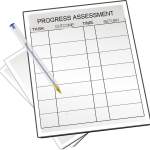Are you properly assessing your progress?
Whenever you start something new, change direction or have a complete overhaul of strategy, you can get completely absorbed in the project and forget to step back occasionally.
This is especially true if you have experienced a severe setback; you just want to move forward, without stopping. That can be the way to future failure; you need to regularly assess your strategy, take an approach like the Egyptians, the assessment process is something that dates to ancient times.
“Dating from approximately six thousand years B.C., in the form of clay tablets found in the ancient city-state of Lagash in modern day Iraq, just northwest of the Tigris and Euphrates Rivers. The king used a tax system called bala, which meant “rotation.” The assessors would focus on one area of the city/state, assessing and taxing one area each month, thereby breaking down the arduous task into more manageable components.”
 Stop at least once a month and look over your strategy and the tasks that are underway or have been accomplished. If you have planned well, you will have built in assessment points and you need to be rigorous about this. Simply looking at your bottom line or checking your bank account is not assessment. Plus, if you are truly assessing the effectiveness of a strategy, money is not the only aspect you consider.
Stop at least once a month and look over your strategy and the tasks that are underway or have been accomplished. If you have planned well, you will have built in assessment points and you need to be rigorous about this. Simply looking at your bottom line or checking your bank account is not assessment. Plus, if you are truly assessing the effectiveness of a strategy, money is not the only aspect you consider.
Assess your use of time
Time management is far more than how many hours a day you work. Some people wear their busy-ness like a badge of honour but underneath all that rushing around very little is being accomplished. It can be easy to become distracted by shiny new ideas that take you away from your main strategy and create a loss of focus. As a speaker to business I am often asked about the effective use of time management and how I managed to find the time to campaign despite the challenges I was facing.
You may not realise how much time you spend on tasks that give no return and don’t contribute to your goals. Part of assessing your progress is to consider whether you should be carrying out all tasks needed personally. Can you delegate some tasks to accelerate the progress? Are there tasks you do towards your goal that could be automated? I have written before about the importance of establishing systems for transition in a business and when you have had to press the reset button after a setback you need those systems even more.
Assess effectiveness and avoid distraction
Look at the statistics measuring how effective that your tasks have been. Those that aren’t working stop doing, those that are do more of. Always leave your mind open to new avenues but don’t let them distract you from the stuff that is working. I tend to keep a note of new ideas and then every quarter break then down into my strategy/tactics/tasks and add them to my overall plan. They replace either discarded tasks or completed ones and keep my strategy fresh and current.
Sometimes we are unable to be objective about the work we are doing towards our goals. Then it is useful to bounce your ideas off someone else and even get an outside critical view on assessing your progress. Passion is often a driving force when we are forced to restart our lives. The downside of passion is that it can blur the view and take us off in the wrong direction.
You also need to understand that although you may have been forced into changing direction- re-invention is the lifeblood of any venture. Companies often book me to speak on this topic as I have so much experience in this field! When you change direction, you may need to change your assessment model as new factors come into play.
In summary- continuous assessment is the most effective way to keep you on track; reduce wasted effort and ensure that, despite the obstacles in your path, you achieve your goals.


